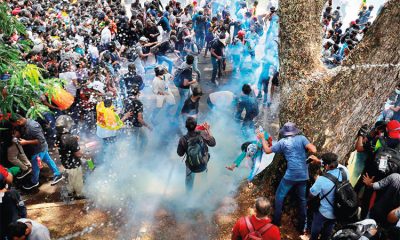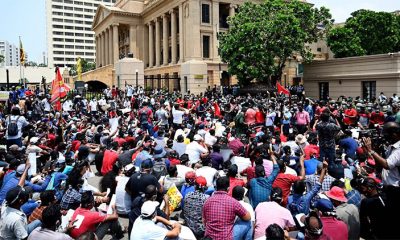Opinion
Should only private sector employees pay income tax?
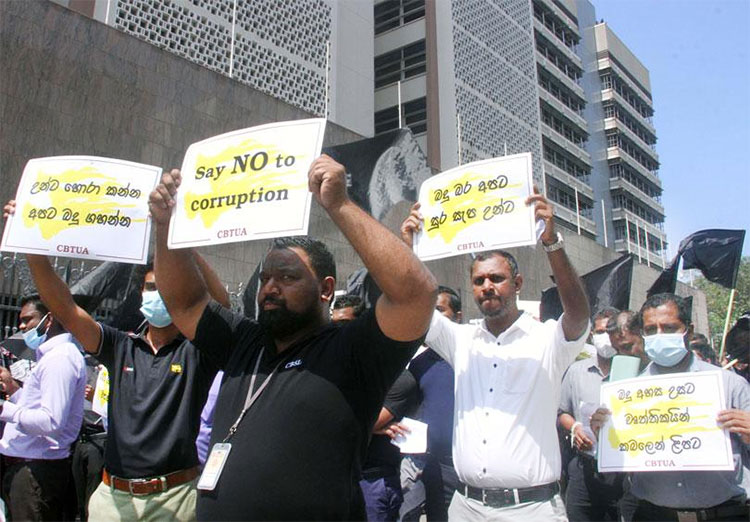
By Sanjeewa Jayaweera
Who currently amongst those who receive a salaried income is not on the streets protesting against the need to pay income tax? The obvious answer is only those working in the private sector. The private sector is often slammed for its reluctance to criticise the government for everything wrong with our country. So their reticence may once again result in only private sector employees paying income tax if the government caves into the demands of the public sector employees and trade unionists.
Based on media reports and television visuals, most state sector employees and those working in state-owned enterprises are on the streets demanding that they not be subject to income tax. Yes, a few say they don’t mind paying income tax but at a lower rate and whilst some demand greater transparency regarding how taxpayer money is spent. However, the overall impression created is that state sector employees don’t want to pay income tax.
As someone who worked in the private sector for nearly three decades and paid significant amounts as income tax, I, too, despised the lack of transparency and equity. However, I did not have the luxury of coming to the streets, refusing to pay the tax, or seeking judicial intervention. I had no choice. My employer deducted the tax and remitted the balance to my bank account.
Shockingly, those protesting against paying income tax are not on the breadline. I see there are two segments. The first lot is mostly public sector employees who are at least in middle management. The second is those in state-owned enterprises earning significantly high salaries and overtime despite being overstaffed.
Those working in the public sector who are out on the street are mostly university graduates who benefited from free education, demanded and received a government job, and earned a pension they never contributed to post-retirement. So their reluctance to pay income tax is perplexing, although many would put it down to the entrenched entitlement mindset.
GMOA IS ONCE AGAIN AT THE FOREFRONT
As usual, the Government Medical Officers Association (GMOA) has been the most vociferous of those objecting to increased income tax rates. That is not surprising because even in 2015, they went to the supreme court seeking relief from paying income tax at the highest rate then of 24%. When they failed, they approached the government requesting that doctors be categorised as part of the small and medium enterprises (SMEs) subjected to only 14%!
So it is unsurprising that they do not want to pay income tax at 36%. It amazes me that doctors, despite benefiting from free university education, the right to engage in private practice, and regular car permits have a great reluctance to pay income tax at the same rates as others. Many stories are circulating about how doctors ask patients to settle their fees in cash, particularly post-surgery, to avoid income tax on their fees.
The good doctors have been joined by judges, university professors, university teachers, engineers and bankers. The only lot that has not joined the protests are those working in the department of Inland Revenue! It would be ironic but not surprising if they do.
It is a shocking indictment of our country’s social fabric that the most supposedly educated citizens feel that they should not be paying income tax and that only those employed in the private sector should bear the income tax burden.
THE GOVERNMENT AND PARLIAMENT ARE NOT WALKING THE TALK
Having said that, I certainly endorse those who protest, saying there is a lack of will on the part of the government to reduce state expenditure and, of course, a lack of transparency as to how our taxes are spent and that rampant corruption is going unchecked.
The appointment of cabinet ministers and state ministers well above what is required solely for political expediency is a case in point. That those appointed are inefficient and some stand accused of corruption makes it even harder to digest.
The much-debated expenditure allocation of Rs 200 million for the independence day celebration whilst asking ordinary citizens to tighten their belts is proof of utter insensitivity and an entrenched mindset of political entitlement. Moreover, the explanation given by the President that the world might think that the country lacks the financial resources to celebrate independence day has left me and many other millions totally incredulous.
Several international aid agencies have assessed that over five million of the population cannot adequately feed themselves, and malnutrition among children is at an all-time high. In addition, foreign and local correspondents have filed media reports of the dire situation in our country. As such, the world is aware of our predicament, and this fact should not escape the President and his cabinet. So who are they trying to deceive?
A principle of good leadership is being able to “walk the talk.” In that respect, the President and his cabinet have been woefully lacking. My criticism is not just limited to the current President and cabinet. The parliament, which includes those in the opposition, can easily demonstrate their commitment to austerity measures that they demand from us by voting to curtail their benefits, such as closing down the parliamentary restaurant where it is claimed that sumptuous meals are served. In the overall context of government expenditure, it might be a meagre amount. However, they need to be seen “walking the talk”.
A media report reported that Rs 800 million had been spent on refurbishing a residence occupied by former President Mahinda Rajapaksa. If this report is indeed correct, then it is an abominable act by someone who keeps repeating that he is with the common person.
A recent report that the Kurunegala Municipal Council has spent Rs. 60 million to remove a stone at a construction site where a building was being constructed for a Maternity and Child Clinic, whereas the approved cost was Rs. 9.3 million reflects the corruption that permeates all state institutions. That none will be charged and jailed for this offence is guaranteed.
I have highlighted a few minor examples of taxpayer money being robbed and wasted. It is, therefore, not surprising that some feel that being subjected to income tax is unfair.
WIDEN THE TAX NET AND IMPOSE A 10% WITHHOLDING TAX ON INTEREST INCOME
There is no doubt that the tax net should be widened. Many liable to tax are not doing so as they are wilfully avoiding tax payment, with many not having a file at the IRD. It was recently reported that as many as 113 members of parliament do not have tax files. In many conversations, a question is raised whether all traders in Pettah have a tax file. From my experience in the private sector, I know that most wholesalers and distributors are either not paying taxes or what they pay is significantly understated. It is generally believed that most of the 500,000 grocery stores are not within the tax net. The IRD is at fault for not forcing these miscreants to register.
An eminently sensible proposal by Dr Nishan De Mel, head of the research agency Verite is to increase the withholding tax (WHT) on interest income to 10 per cent. He has argued that the additional tax collected would enable the government to give a tax reduction to those earning salaries above Rs 100,000 to maybe Rs. 500,000 per month. His suggestion is based on the assumption that most of our country’s “super rich” are underpaying taxes. Taxes collected as the source is guaranteed income for the state. An argument that may be put forward against this is that it will penalise pensioners who may not be liable for tax. The IRD issuing a tax direction can resolve this by confirming that the recipient is not liable for tax. The reluctance of the government to adopt the suggestion is perplexing, if not surprising.
THE NEED TO INCULCATE PAYING OF INCOME TAX AT A YOUNG AGE
Returning to why most state sector employees are reluctant to pay income tax, I believe that the reluctance has been ingrained in their DNA by successive governments by exempting them from income tax. This is because so many good social attributes are taught, and people are exposed to them at a young age.
In my case, my parents inculcated in me that I have a social responsibility to those underprivileged and, of course, the need to adhere to the law of any country I live. At 18, when I worked part-time as a petrol station attendant in the UK whilst studying, my salary was subject to income tax. Despite my nominal wage, I was conditioned to the need to pay income tax. It is the same discipline I adhered to during my working career, and even after my retirement pay my taxes every quarter without any underpayment or delay. It is the same for all private sector employees in our country, where the employer deducts income tax from the salary. So they are conditioned at an early age to the proverb, “Nothing is certain in life other than death and taxes.”
Those employed in state-owned enterprises have gotten used to the employer bearing the tax on their behalf. So the new rule that the employer will no longer be allowed to absorb the tax is causing them much distress. Yet, shockingly, such a scheme has been in existence. The mindset of state employees was illustrated when recently, an employee of the Ministry of Finance justified this practice by saying, “What does it matter whether the employer bears the tax? After all, the IRD receives the tax” It is a shocking reflection of the prevailing attitude.
It is a universally accepted social principle that those better off must contribute a fair share towards maintaining those less well off and other services that the state provides, either free or at subsidised price levels. The responsibility of paying income tax is even more critical in a society that has accepted free education and free health care should be a right of every citizen. It is, therefore, difficult to comprehend why our supposedly educated citizens who have immensely benefited from free education are now unappreciative of the need to repay the state and the citizens a fair share of their income. I am shocked that university professors and teachers, who are assumed to be a fountain of knowledge and appreciate social responsibilities, are also out on the street protesting against the increase in income tax rates. The same applies to those at the Central Bank, who should understand our economy’s perilous state more than others.
Opinion
Thoughts for Unduvap Poya
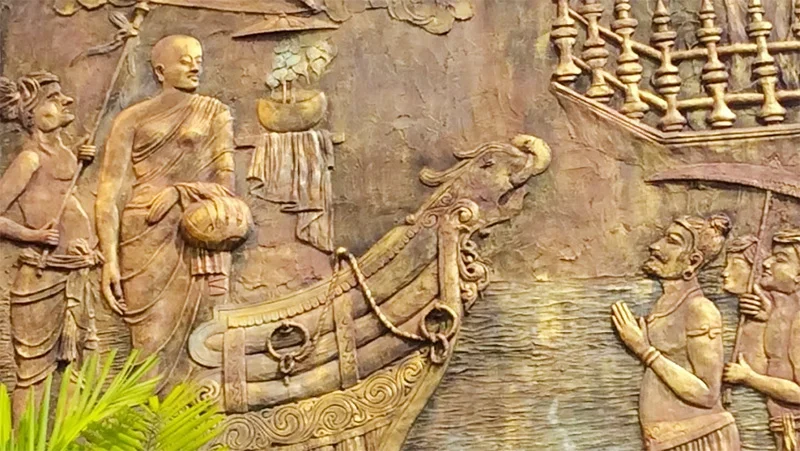
Unduvap Poya, which falls today, has great historical significance for Sri Lanka, as several important events occurred on that day but before looking into these, as the occasion demands, our first thought should be about impermanence. One of the cornerstones of Buddha’s teachings is impermanence and there is no better time to ponder over it than now, as the unfolding events of the unprecedented natural disaster exemplify it. Who would have imagined, even a few days ago, the scenes of total devastation we are witnessing now; vast swathes of the country under floodwaters due to torrential rain, multitudes of earth slips burying alive entire families with their hard-built properties and closing multiple trunk roads bringing the country to a virtual standstill. The best of human kindness is also amply demonstrated as many risk their own lives to help those in distress.
In the struggle of life, we are attached and accumulate many things, wanted and unwanted, including wealth overlooking the fact that all this could disappear in a flash, as happened to an unfortunate few during this calamitous time. Even the survivors, though they are happy that they survived, are left with anxiety, apprehension, and sorrow, all of which is due to attachment. We are attached to things because we fail to realise the importance of impermanence. If we do, we would be less attached and less affected. Realisation of the impermanent nature of everything is the first step towards ultimate detachment.
It was on a day like this that Arahant Bhikkhuni Sanghamitta arrived in Lanka Deepa bringing with her a sapling of the Sri Maha Bodhi tree under which Prince Siddhartha attained Enlightenment. She was sent by her father Emperor Ashoka, at the request of Arahant Mahinda who had arrived earlier and established Buddhism formally under the royal patronage of King Devanampiyatissa. With the very successful establishment of Bhikkhu Sasana, as there was a strong clamour for the establishment of Bhikkhuni Sasana as well, Arahant Mahinda requested his father to send his sister which was agreed to by Emperor Ashoka, though reluctantly as he would be losing two of his children. In fact, both served Lanka Deepa till their death, never returning to the country of their birth. Though Arahant Sanghamitta’s main mission was otherwise, her bringing a sapling of the Bo tree has left an indelible imprint in the annals of our history.
According to chronicles, King Devanampiyatissa planted the Bo sapling in Mahamevnawa Park in Anuradhapura in 288 BCE, which continues to thrive, making it the oldest living human planted tree in the world with a known planting date. It is a treasure that needs to be respected and protected at all costs. However, not so long ago it was nearly destroyed by the idiocy of worshippers who poured milk on the roots. Devotion clouding reality, they overlooked the fact that a tree needs water, not milk!
A monk developed a new practice of Bodhi Puja, which even today attracts droves of devotees and has become a ritual. This would have been the last thing the Buddha wanted! He expressed gratitude by gazing at the tree, which gave him shelter during the most crucial of times, for a week but did not want his followers to go around worshipping similar trees growing all over. Instead of following the path the Buddha laid for us, we seem keen on inventing new rituals to indulge in!
Arahant Sanghamitta achieved her prime objective by establishing the Bhikkhuni Sasana which thrived for nearly 1200 years till it fell into decline with the fall of the Anuradhapura kingdom. Unfortunately, during the Polonnaruwa period that followed the influence of Hinduism over Buddhism increased and some of the Buddhist values like equality of sexes and anti-casteism were lost. Subsequently, even the Bhikkhu Sasana went into decline. Higher ordination for Bhikkhus was re-established in 1753 CE with the visit of Upali Maha Thera from Siam which formed the basis of Siam Maha Nikaya. Upali Maha Thero is also credited with reorganising Kandy Esala Perahera to be the annual Procession of the Temple of Tooth, which was previously centred around the worship of deities, by getting a royal decree: “Henceforth Gods and men are to follow the Buddha”
In 1764 CE, Siyam Nikaya imposed a ‘Govigama and Radala’ exclusivity, disregarding a fundamental tenet of the Buddha, apparently in response to an order from the King! Fortunately, Buddhism was saved from the idiocy of Siyam Nikaya by the formation of Amarapura Nikaya in 1800 CE and Ramanna Nikaya in 1864 CE, higher ordination for both obtained from Burma. None of these Niakya’s showed any interest in the re-establishment of Bhikkhuni Sasana which was left to a band of interested and determined ladies.
My thoughts and admiration, on the day Bhikkhuni Sasana was originally established, go to these pioneers whose determination knew no bounds. They overcame enormous difficulties and obtained higher ordination from South Korea initially. Fortunately, Ven. Inamaluwe Sri Sumangala Thero, Maha Nayaka of Rangiri Dambulla Chapter of Siyam Maha Nikaya started offering higher ordination to Bhikkhunis in 1998 but state recognition became a sore point. When Venerable Welimada Dhammadinna Bhikkhuni was denied official recognition as a Bhikkhuni on her national identity card she filed action, with the support of Ven. Inamaluwe Sri Sumangala Thero. In a landmark majority judgement delivered on 16 June, the Supreme Court ruled that the fundamental rights of Ven. Dhammadinna were breached and also Bhikkhuni Sasana was re-established in Sri Lanka. As this judgement did not receive wide publicity, I wrote a piece titled “Buddhism, Bhikkhus and Bhikkhunis” (The Island, 10 July 2025) and my wish for this Unduvap Poya is what I stated therein:
“The landmark legal battle won by Bhikkhunis is a victory for common sense more than anything else. I hope it will help Bhikkhuni Sasana flourish in Sri Lanka. The number of devotees inviting Bhikkhunis to religious functions is increasing. May Bhikkhunis receive the recognition they richly deserve.” May there be a rapid return to normalcy from the current tragic situation.”
by Dr Upul Wijayawardhana
Opinion
Royal Over Eighties
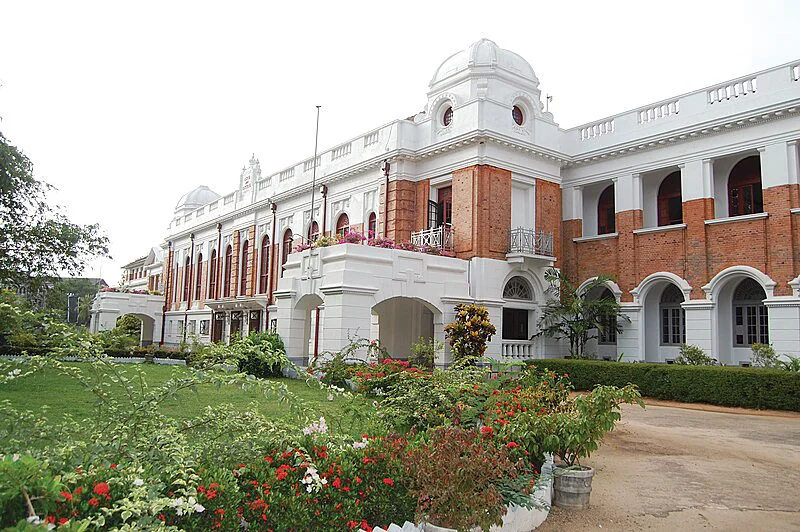
The gathering was actually of ‘Over Seventies’ but those of my generation present were mostly of the late eighties.
Even of them I shall mention only those whom I know at least by name. But, first, to those few of my years and older with whom speech was possible.
First among them, in more sense than one, was Nihal Seneviratne, at ninety-one probably the oldest present. There is no truth to the story that his state of crisp well-being is attributable to the consumption of gul-bunis in his school days. It is traceable rather to a life well lived. His practice of regular walks around the house and along the lane on which he lives may have contributed to his erect posture. As also to the total absence of a walking stick, a helper, or any other form of assistance as he walked into the Janaki hotel where this gathering took place.
Referencing the published accounts of his several decades-long service in Parliament as head of its administration, it would be moot to recall that his close friend and fellow lawyer, J E D Gooneratne, teased him in the following terms: “You will be a bloody clerk all your life”. He did join service as Second Assistant to the Clerk to the House and moved up, but the Clerk became the Secretary General. Regardless of such matters of nomenclature, it could be said that Nihal Seneviratne ran the show.
Others present included Dr. Ranjith de Silva, Surgeon, who was our cricket Captain and, to the best of my knowledge, has the distinction of never engaging in private practice.
The range of Dr. K L (Lochana) Gunaratne’s interests and his accomplishments within each are indeed remarkable. I would think that somebody who’d received his initial training at the AA School of Architecture in London would continue to have architecture as the foundation of his likes /dislikes. Such would also provide a road map to other pursuits whether immediately related to that field or not. That is evident in the leadership roles he has played in the National Academy of Sciences and the Institute of Town Planners among others. As I recall he has also addressed issues related to the Panadura Vadaya.
My memories of D L Seneviratne at school were associated with tennis. As happens, D L had launched his gift for writing over three decades ago with a history of tennis in Sri Lanka (1991). That is a game with which my acquaintance is limited to sending a couple of serves past his ear (not ‘tossing the ball across’ as he asked me to) while Jothilingam, long much missed, waited for his team mates to come for practices. It is a game at which my father spent much time both at the Railway sports club and at our home-town club. (By some kind of chance, I recovered just a week ago the ‘Fred de Saram Challenge Cup’ which, on his winning the Singles for the third time, Koo de Saram came over to the Kandana Club to hand over to him for keeps. They played an exhibition match which father won). D L would know whether or not, as I have heard, in an exhibition match in Colombo, Koo defeated Frank Sedgman, who was on his triumphant return home to Oz after he had won the Wimbledon tournament in London.
I had no idea that D L has written any books till my son brought home the one on the early history of Royal under Marsh and Boake, (both long-bearded young men in their twenties).
It includes a rich assortment of photographs of great value to those who are interested in the history of the Anglican segment of Christian missionary activity here in the context of its contribution to secondary school education. Among them is one of the school as it appeared on moving to Thurstan road from Mutwal. It has been extracted from the History of Royal, 1931, done by students (among whom a relative, Palitha Weeraman, had played a significant role).
As D L shows, (in contra-distinction to the Catholic schools) the CMS had engaged in a largely secular practice. Royal remained so through our time – when one could walk into the examination room and answer questions framed to test one’s knowledge of Christianity, Buddhism, Hinduism and Islam; a knowledge derived mostly from the lectures delivered by an Old Boy at general assembly on Friday plus readings from the Dhammapada, the Bhagavad Gita, the St. John’s version of the Bible or the Koran recited by a student at senior assembly on Tuesday / Thursday.
D L’s history of Royal College had followed in 2006.
His writing is so rich in detail, so precise in formulation, that I would consider this brief note a simple prompt towards a publisher bringing out new editions at different levels of cost.
It was also a pleasure to meet Senaka Amarasinghe, as yet flaunting his Emperor profile, and among the principal organisers of this event.
The encounter with I S de Silva, distinguished attorney, who was on Galle road close to Janaki lane, where I lived then was indeed welcome. As was that with Upali Mendis, who carried out cataract surgery on my mother oh so long ago when he was head of the Eye Hospital. His older brother, L P, was probably the most gifted student in chemistry in our time.
Most serendipitous perhaps was meeting a son of one of our most popular teachers from the 1950s, – Connor Rajaratnam. His cons were a caution.
by Gamini Seneviratne
Opinion
“Regulatory Impact Assessment – Not a bureaucratic formality but essentially an advocacy tool for smarter governance”: A response
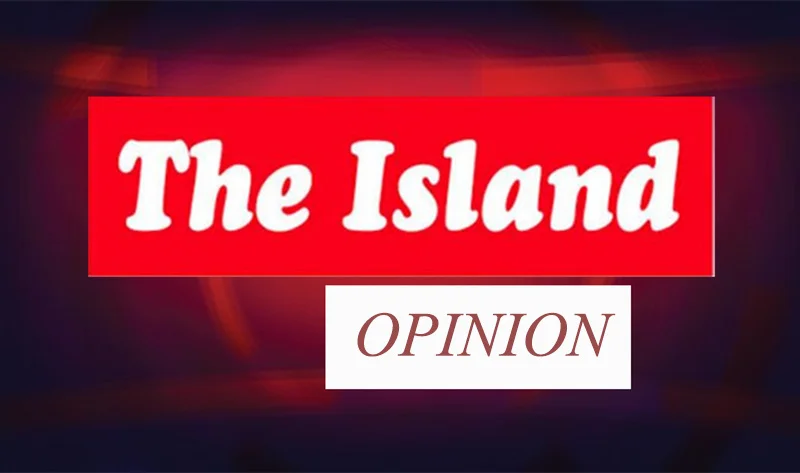
Having meticulously read and re-read the above article published in the opinion page of The Island on the 27 Nov, I hasten to make a critical review on the far-reaching proposal made by the co-authors, namely Professor Theekshana Suraweera, Chairman of the Sri Lanka Standards Institution and Dr. Prabath.C.Abeysiriwardana, Director of Ministry of Science and Technology
The aforesaid article provides a timely and compelling critique of Sri Lanka’s long-standing gaps in evidence-based policymaking and argues persuasively for the institutional adoption of Regulatory Impact Assessment (RIA). In a context where policy missteps have led to severe economic and social consequences, the article functions as an essential wake-up call—highlighting RIA not as a bureaucratic formality but as a foundational tool for smarter governance.
One of the article’s strongest contributions is its clear explanation of how regulatory processes currently function in Sri Lanka: legislation is drafted with narrow legal scrutiny focused mainly on constitutional compliance, with little or no structured assessment of economic, social, cultural, or environmental impacts. The author strengthens this argument with well-chosen examples—the sudden ban on chemical fertilizer imports and the consequences of the 1956 Official Language Act—demonstrating how untested regulation can have far-reaching negative outcomes. These cases effectively illustrate the dangers of ad hoc policymaking and underscore the need for a formal review mechanism.
The article also succeeds in demystifying RIA by outlining its core steps—problem definition, option analysis, impact assessment, stakeholder consultation, and post-implementation review. This breakdown makes it clear that RIA is not merely a Western ideal but a practical, structured, and replicable process that could greatly improve policymaking in Sri Lanka. The references to international best practices (such as the role of OIRA in the United States) lend credibility and global context, showing that RIA is not experimental but an established standard in advanced governance systems.
However, the article could have further strengthened its critique by addressing the political economy of reform: the structural incentives, institutional resistance, and political culture that have historically obstructed such tools in Sri Lanka. While the challenges of data availability, quantification, and political pressure are briefly mentioned, a deeper analysis of why evidence-based policymaking has not taken root—and how to overcome these systemic barriers—would have offered greater practical value.
Another potential enhancement would be the inclusion of local micro-level examples where smaller-scale regulations backfired due to insufficient appraisal. This would help illustrate that the problem is not limited to headline-making policy failures but affects governance at every level.
Despite these minor limitations, the article is highly effective as an advocacy piece. It makes a strong case that RIA could transform Sri Lanka’s regulatory landscape by institutionalizing foresight, transparency, and accountability. Its emphasis on aligning RIA with ongoing national initiatives—particularly the strengthening of the National Quality Infrastructure—demonstrates both pragmatism and strategic vision.
At a time, when Chairmen of statutory bodies appointed by the NPP government play a passive voice, the candid opinion expressed by the CEO of SLSI on the necessity of a Regulatory Impact Assessment is an important and insightful contribution. It highlights a critical missing link in Sri Lanka’s policy environment and provides a clear call to action. If widely circulated and taken seriously by policymakers, academics, and civil society, it could indeed become the eye-opener needed to push Sri Lanka toward more rational, responsible, and future-ready governance.
J. A. A. S. Ranasinghe,
Productivity Specialty and Management Consultant
(rathula49@gmail.com)
-
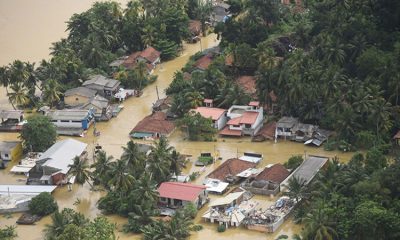
 News5 days ago
News5 days agoWeather disasters: Sri Lanka flooded by policy blunders, weak enforcement and environmental crime – Climate Expert
-
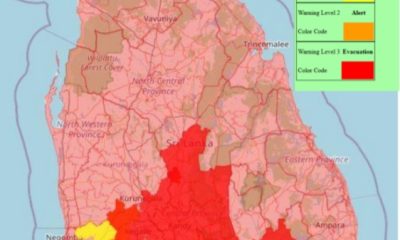
 Latest News6 days ago
Latest News6 days agoLevel I landslide RED warnings issued to the districts of Badulla, Colombo, Gampaha, Kalutara, Kandy, Kegalle, Kurnegala, Natale, Monaragala, Nuwara Eliya and Ratnapura
-

 Latest News6 days ago
Latest News6 days agoINS VIKRANT deploys helicopters for disaster relief operations
-
News2 days ago
Lunuwila tragedy not caused by those videoing Bell 212: SLAF
-

 Latest News6 days ago
Latest News6 days agoDepartment of Irrigation issues Critical flood warning to the Kelani river basin
-

 Latest News3 days ago
Latest News3 days agoLevel III landslide early warnings issued to the districts of Badulla, Kandy, Kegalle, Kurunegala, Matale and Nuwara-Eliya
-
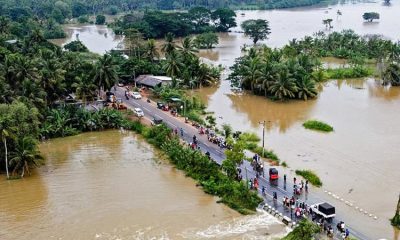
 News6 days ago
News6 days agoCountry reels under worst weather in living memory
-

 Editorial6 days ago
Editorial6 days agoNeeded: Action not rhetoric






